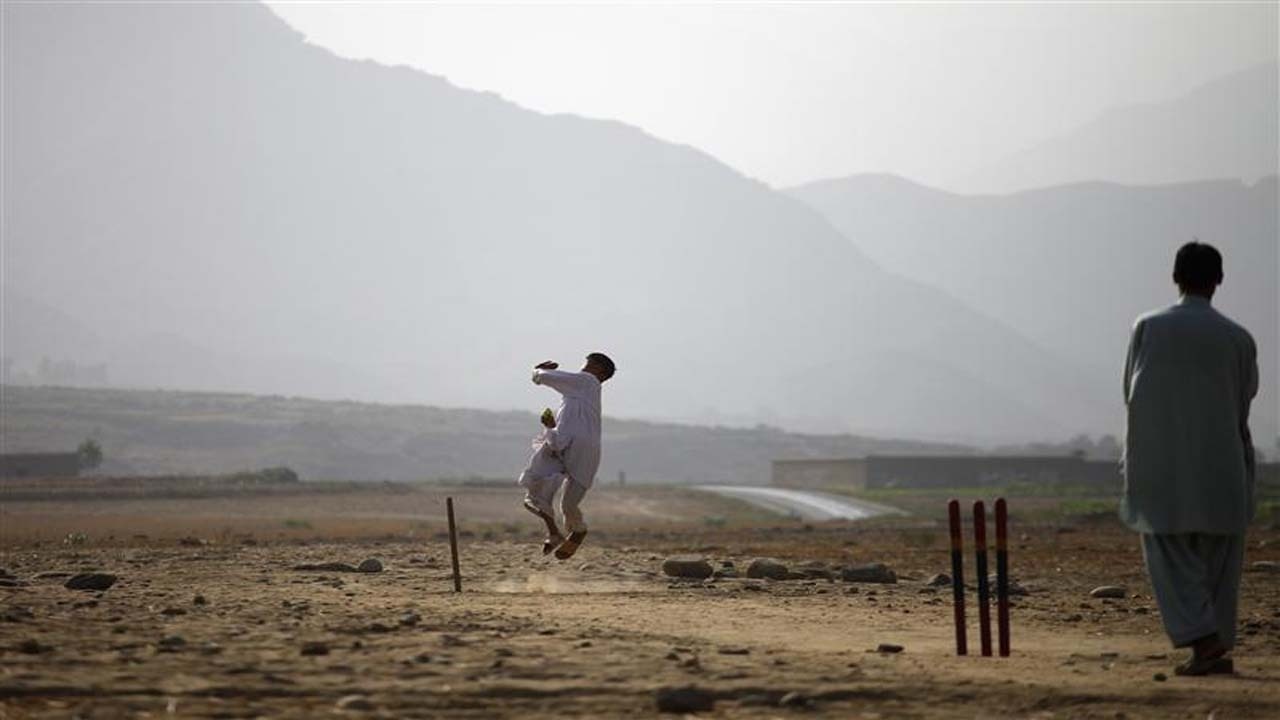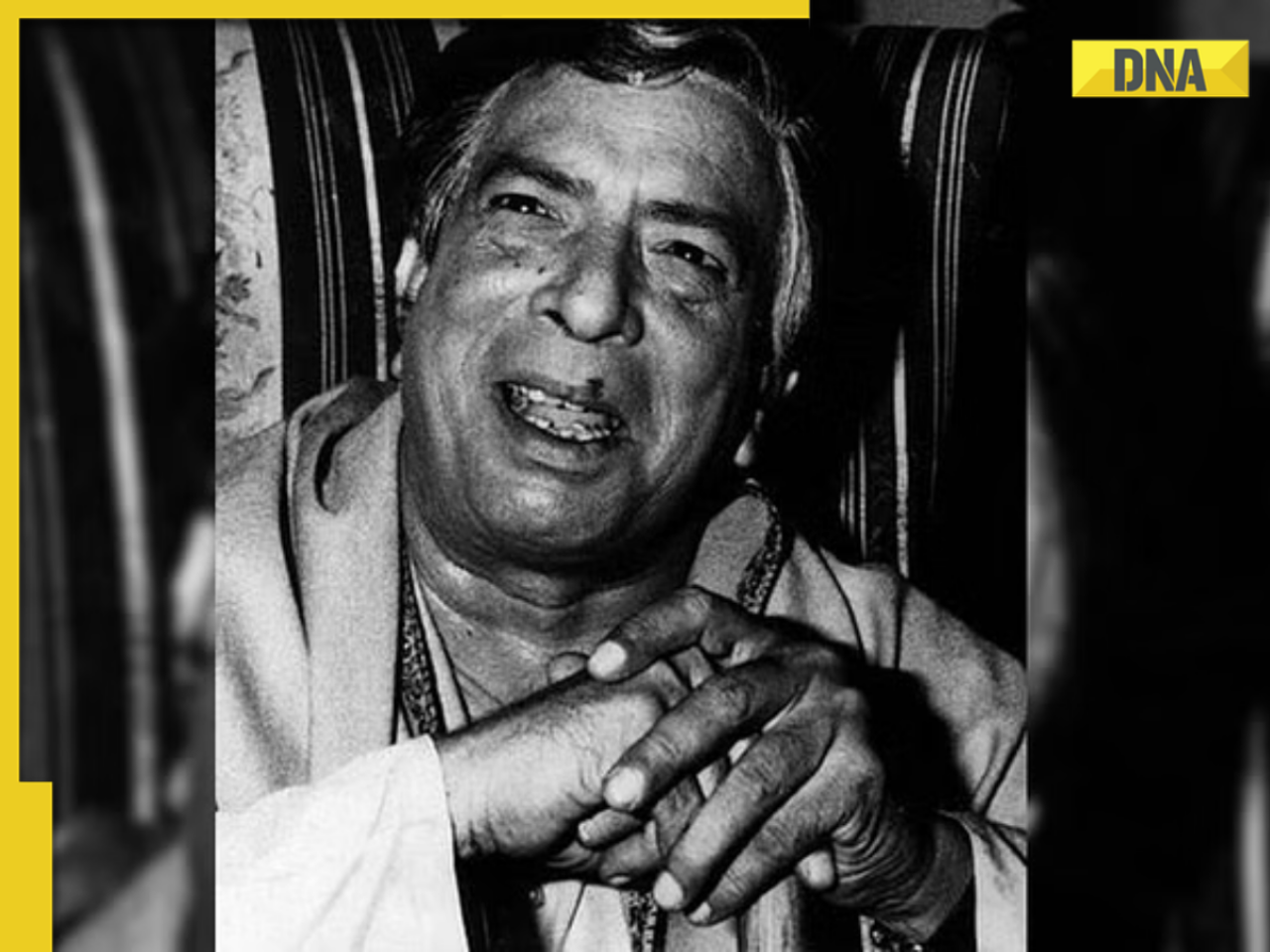During the conflict, the Afghan refugees in Pakistan picked up the sport and when they returned back to their country they brought the game along.
"I appeal to the leaders of the world; please don't let Afghanistan go into chaos." "We need your support. We want peace." The former Afghan national cricket captain Mohammad Nabi tweeted these lines in distress just days before the fall of Kabul.
But it seems no one heard his desperation and days after the tweet, his beloved country had already gone into the hands of the Taliban putting the fate of Afghan cricket in jeopardy. In a poverty-stricken but cricket-mad country the players of the national team are finding it increasingly difficult to focus on the game.
The calm of the empty international cricket stadium in Kabul is a sharp contrast to the chaos taking place a few kilometres north, where tens of thousands of Afghans at the Hamid Karzai International airport are desperately trying to flee on evacuation flights.
The fear in the eyes of the players are real as the first political stint of the Taliban is afresh in the minds of the Afghan citizens. For the Taliban who strictly follow the Sharia Law, any source of entertainment is 'haram' - from watching movies and going to theatres, from listening to music or playing any type of sports. However, they were not against the English sport cricket which was quite popular among the Taliban fighters.
It was until the early 2000s, that the Afghans were first introduced to this sport. During the conflict in Afghanistan, the Afghan refugees in Pakistan picked up the sport and when they returned back to their country they brought the sport along with them.
Since then there has been no looking back for the national cricket team that rose on the international scene, gaining coveted Test status in 2017 and now ranked among the top 10 sides in the world in the one-day and Twenty20 formats. It also helped in uniting a country caught between civil war and ethnic conflict.
So the question arises as to whether the fate of Afghan cricket will go the same way as Zimbabwe cricket had to face years ago after a decline in the political and economic circumstances of the country? Only time will tell that. But here we try to analyse what the Taliban is saying about cricket in the country and what happened in Zimbabwe a decade back.

Taliban promises support to Afghanistan cricket
Taliban say Afghans started playing cricket when they ruled previously and that they will support the sport going forward.
Anas Haqqani, a member of the Taliban's political office recently met the national cricket team captain Hashmatullah Shahidi, former cricket board selection committee chairman Asadullah and Noor Ali Zadran.
During the meeting, Haqqani who is also a member of the negotiating team for the Taliban reassured the cricket sector and pledged to assess cricketers' problems immediately.
During the meeting, the players thanked Anas Haqqani and his delegation and expressed their hope for support from the Taliban.
Earlier, Taliban spokesperson Sohail Shaheen also expressed support for the cricket team and said he hoped to watch the planned Afghanistan-Pakistan matches.
The fate of Zimbabwe Cricket
There was the mass migration of the minority white population of Zimbabwe under the regime of Robert Mugabe, who came to power after his political struggle.
Mugabe implemented land reforms in 2000, which resulted in the seizing of 80% of white-owned farms from landowners forcing thousands of evictions and arrests.
It was against this political backdrop that Zimbabwean cricket's precise moment of disintegration occurred by 2003, for a team that was rising in the field of cricket
Henry Olonga and Andy Flower had to face the brunt for wearing the black armbands during a match to 'mourn the death of democracy in Zimbabwe'.
On July 19, 2019, the International Cricket Council (ICC) had suspended Zimbabwe Cricket because of government interference in their cricketing affairs.
Funding to Zimbabwe Cricket was frozen and was barred from taking part in any upcoming ICC events.
The ban possibly closed one of cricket's glorious chapters, in which a team rose through the ranks to emerge as a force to reckon with and make their mark on the map of world cricket.
![submenu-img]() IND vs SL, 1st T20I: Predicted playing XIs, live streaming details, weather and pitch report
IND vs SL, 1st T20I: Predicted playing XIs, live streaming details, weather and pitch report![submenu-img]() Women's Asia Cup 2024: India beat Bangladesh by 10 wickets to reach ninth successive final
Women's Asia Cup 2024: India beat Bangladesh by 10 wickets to reach ninth successive final![submenu-img]() Apple reduces prices of iPhones across models, iPhones 13, 14 and 15 will be cheaper by Rs...
Apple reduces prices of iPhones across models, iPhones 13, 14 and 15 will be cheaper by Rs...![submenu-img]() 'Elon Musk treated me badly for...,' says Tesla chief's daughter Vivian Jenna Wilson
'Elon Musk treated me badly for...,' says Tesla chief's daughter Vivian Jenna Wilson![submenu-img]() Watch video: 'Questionable' Indian food served to employees in Dutch office; Internet reacts
Watch video: 'Questionable' Indian food served to employees in Dutch office; Internet reacts![submenu-img]() Hypertension: Signs of high blood pressure that appear in morning
Hypertension: Signs of high blood pressure that appear in morning![submenu-img]() 8 Hollywood blockbusters with best VFX
8 Hollywood blockbusters with best VFX![submenu-img]() 6 superstars who didn't attend Abhishek Bachchan-Aishwarya Rai's wedding
6 superstars who didn't attend Abhishek Bachchan-Aishwarya Rai's wedding![submenu-img]() Breathtaking images of galaxies captured by NASA telescope
Breathtaking images of galaxies captured by NASA telescope![submenu-img]() Bollywood celebs pay final respects to Farah Khan's late mother Menka Irani
Bollywood celebs pay final respects to Farah Khan's late mother Menka Irani![submenu-img]() Meet woman, a doctor who cleared UPSC exam to become IAS officer, resigned after 7 years due to...
Meet woman, a doctor who cleared UPSC exam to become IAS officer, resigned after 7 years due to...![submenu-img]() Meet IAS officer, one of India's most educated men, who earned 20 degrees, gold medals in...
Meet IAS officer, one of India's most educated men, who earned 20 degrees, gold medals in...![submenu-img]() Meet Maths genius, who worked with IIT, NASA, went missing suddenly, was found after years..
Meet Maths genius, who worked with IIT, NASA, went missing suddenly, was found after years..![submenu-img]() Meet Indian genius who fled to Delhi from Pakistan, worked at two IITs, awarded India’s top science award for…
Meet Indian genius who fled to Delhi from Pakistan, worked at two IITs, awarded India’s top science award for…![submenu-img]() Meet woman who cracked UPSC exam after accident, underwent 14 surgeries, still became IAS officer, she is...
Meet woman who cracked UPSC exam after accident, underwent 14 surgeries, still became IAS officer, she is...![submenu-img]() 5 Men Rape Australian Woman In Paris Just Days Ahead Of Olympic | Paris Olympics 2024
5 Men Rape Australian Woman In Paris Just Days Ahead Of Olympic | Paris Olympics 2024![submenu-img]() US Elections: 'I Know Trump's Type', Says Kamala Harris As She Launches Election Campaign
US Elections: 'I Know Trump's Type', Says Kamala Harris As She Launches Election Campaign![submenu-img]() Breaking! Nepal Plane Crash: Saurya Airlines Flight With 19 On Board Crashes In Kathmandu
Breaking! Nepal Plane Crash: Saurya Airlines Flight With 19 On Board Crashes In Kathmandu![submenu-img]() J&K Encounter: Search Operation By Indian Army, Police Continue, 1 Terrorist Neutralised In Kupwara
J&K Encounter: Search Operation By Indian Army, Police Continue, 1 Terrorist Neutralised In Kupwara![submenu-img]() Breaking! Nepal Plane Crash: Saurya Airlines Flight With 19 On Board Crashes In Kathmandu
Breaking! Nepal Plane Crash: Saurya Airlines Flight With 19 On Board Crashes In Kathmandu![submenu-img]() NASA images: 7 mesmerising images of space will make you fall in love with astronomy
NASA images: 7 mesmerising images of space will make you fall in love with astronomy![submenu-img]() 8 athletes with most Olympic medals
8 athletes with most Olympic medals![submenu-img]() In pics: Step inside Jalsa, Amitabh Bachchan, Jaya Bachchan's Rs 120 crore mansion with gym, jacuzzi, aesthetic decor
In pics: Step inside Jalsa, Amitabh Bachchan, Jaya Bachchan's Rs 120 crore mansion with gym, jacuzzi, aesthetic decor![submenu-img]() Remember Paul Blackthorne, Lagaan's Captain Russell? Quit films, did side roles in Hollywood, looks unrecognisable now
Remember Paul Blackthorne, Lagaan's Captain Russell? Quit films, did side roles in Hollywood, looks unrecognisable now![submenu-img]() This actor was called next superstar, bigger than Amitabh, Vinod Khanna, then lost stardom, was arrested for wife's...
This actor was called next superstar, bigger than Amitabh, Vinod Khanna, then lost stardom, was arrested for wife's...![submenu-img]() Meet man, tribal who tipped off Army about Pakistani intruders in Kargil, awaits relief from govt even after...
Meet man, tribal who tipped off Army about Pakistani intruders in Kargil, awaits relief from govt even after...![submenu-img]() Puja Khedkar case latest update: Shocking details about her parents Manorama Khedkar, Dilip Khedkar revealed
Puja Khedkar case latest update: Shocking details about her parents Manorama Khedkar, Dilip Khedkar revealed![submenu-img]() Kargil Vijay Diwas Live Updates: PM Modi visits Dras to mark 25th anniversary of Kargil Vijay Diwas
Kargil Vijay Diwas Live Updates: PM Modi visits Dras to mark 25th anniversary of Kargil Vijay Diwas![submenu-img]() Big rejig in BJP: New state chief for Bihar and Rajasthan named
Big rejig in BJP: New state chief for Bihar and Rajasthan named![submenu-img]() Mumbai rains: Schools, colleges to operate normally today, BMC urges citizens to...
Mumbai rains: Schools, colleges to operate normally today, BMC urges citizens to...![submenu-img]() DRDO fortifies India's skies: Phase II ballistic missile defence trial successful
DRDO fortifies India's skies: Phase II ballistic missile defence trial successful![submenu-img]() Gaza Conflict Spurs Unlikely Partners: Hamas, Fatah factions sign truce in Beijing
Gaza Conflict Spurs Unlikely Partners: Hamas, Fatah factions sign truce in Beijing![submenu-img]() Crackdowns and Crisis of Legitimacy: What lies beyond Bangladesh's apex court scaling down job quotas
Crackdowns and Crisis of Legitimacy: What lies beyond Bangladesh's apex court scaling down job quotas![submenu-img]() Area 51: Alien testing ground or enigmatic US military base?
Area 51: Alien testing ground or enigmatic US military base?![submenu-img]() Transforming India's Aerospace Industry: Budget 2024 and Beyond
Transforming India's Aerospace Industry: Budget 2024 and Beyond![submenu-img]() Chalti Rahe Zindagi review: Siddhant Kapoor's relatable but boring lockdown drama can be skipped
Chalti Rahe Zindagi review: Siddhant Kapoor's relatable but boring lockdown drama can be skipped ![submenu-img]() 'This is nothing but...': Pahlaj Nihalani on CBFC's delay in censor certification of John Abraham's Vedaa
'This is nothing but...': Pahlaj Nihalani on CBFC's delay in censor certification of John Abraham's Vedaa ![submenu-img]() Does Janhvi Kapoor pay for social media praise, positive comments? Actress reacts, 'itna budget...'
Does Janhvi Kapoor pay for social media praise, positive comments? Actress reacts, 'itna budget...'![submenu-img]() Parineeti Chopra's cryptic post about 'throwing toxic people out of life' scares fans: 'Stop living for...'
Parineeti Chopra's cryptic post about 'throwing toxic people out of life' scares fans: 'Stop living for...'![submenu-img]() Highest grossing animated film ever has earned Rs 12200 crore; beat The Lion King, Toy Story, Frozen, Minions, Shrek
Highest grossing animated film ever has earned Rs 12200 crore; beat The Lion King, Toy Story, Frozen, Minions, Shrek![submenu-img]() Watch video: 'Questionable' Indian food served to employees in Dutch office; Internet reacts
Watch video: 'Questionable' Indian food served to employees in Dutch office; Internet reacts![submenu-img]() This small nation is most important country in world, plays huge role in shaping geopolitics, it is...
This small nation is most important country in world, plays huge role in shaping geopolitics, it is...![submenu-img]() El Mayo in US custody: Who is Mexican drug lord Ismael Zambada, Sinaloa cartel leader arrested with El Chapo's son?
El Mayo in US custody: Who is Mexican drug lord Ismael Zambada, Sinaloa cartel leader arrested with El Chapo's son?![submenu-img]() Viral video: 15-foot python attacks and nearly swallows Jabalpur man, here's how locals save him, watch
Viral video: 15-foot python attacks and nearly swallows Jabalpur man, here's how locals save him, watch![submenu-img]() 'Anant knows everything': Akash Ambani, Isha Ambani tell Amitabh Bachchan as…
'Anant knows everything': Akash Ambani, Isha Ambani tell Amitabh Bachchan as…













































)
)
)
)
)
)
)
)
)
)
)
)
)
)
)





)
)
)
)
)
)